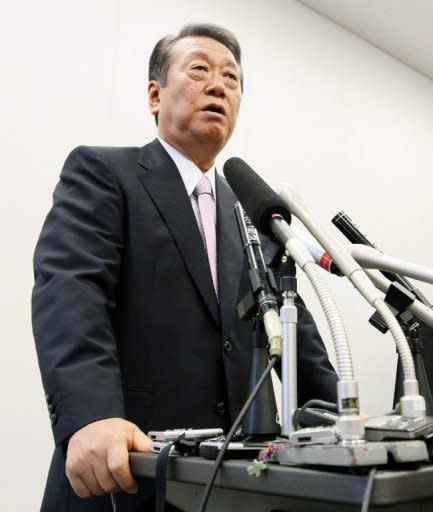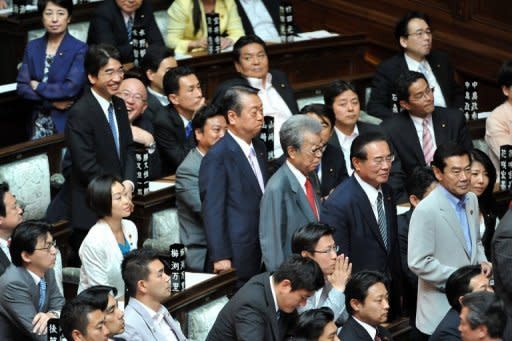Japan sales tax bill passes despite rebellion
Prime Minister Yoshihiko Noda's prized sales tax bill passed Japan's lower house Tuesday but a sizable rebellion and threatened party split left his future hanging in the balance. Legislation to double consumption tax to help pay off Japan's mountainous debt comfortably cleared a lower chamber ballot, despite the votes of a wayward faction in the governing Democratic Party of Japan (DPJ). After months of furious horse-trading that brought the two largest opposition parties on board, the passage of the bill had not been in doubt. Of the 459 votes cast, 363 were in favour, with 96 votes against. A tally by broadcaster NHK showed 57 members of the DPJ defied the party line. But the future of Noda's administration now hangs on whether those rebels will leave the party -- a threat some of them, led by veteran dealmaker Ichiro Ozawa, have openly made. If at least 54 of them follow through, the DPJ will lose its majority in the lower chamber, which has the power to appoint prime ministers. Local media said the number of rebels, coupled with around 20 absences or abstentions would provide a fillip to Ozawa, a divisive figure who has been a fixture in Japanese politics for decades. A triumphant Ozawa stopped short of saying he would jump ship immediately, but warned he would remain a thorn in Noda's side. "Going ahead with a tax hike is a betrayal of the people...an act of lying," he said, a reference to the absence of any proposal in the DPJ manifesto. "It was good to express my intention clearly together with a lot of friends. We cannot waste our time as elections are expected to be coming very soon. "I will do my best to the end, and then will have to make a decision before long on what to do" about leaving the party. If Ozawa's mooted breakaway has the critical mass to upend Noda's majority, opponents will likely seize the opportunity and call a confidence vote. That would leave the prime minister with little choice but to go to the electorate, with opinion polls suggesting he would receive a drubbing. Noda, who has staked his premiership on a tax rise widely believed to be a sensible way for Japan to begin plugging its fiscal hole, said he would deal with party dissidents, but did not give details. "It was an extremely regrettable result. I want to handle it strictly following party rules," he told a news conference. The DPJ leadership has been seen as soft pedalling on the rebels and has thus far been unwilling to cast them out into the wilderness for fear of irking Ozawa and giving him the momentum he needs. But that approach may have contributed to the size of the mutiny commentators said, with potential dissidents emboldened by the absence of any real penalty for disobeying the party line. Shinichi Nishikawa, professor of politics at Meiji University in Tokyo, said the vote could herald the death knell for Noda's 10-month-old administration and the party as a whole. "The DPJ has lost its unifying force and party discipline," he told AFP. "It may not work as a political party any more. Ozawa may not leave the party immediately, but it does not mean he has given up the option. "This may be the beginning of an end of the party." Noda has warned that the future of the world's third-largest economy rests on tackling its huge public debt, which at more than double GDP, is proportionately the world's largest. Opponents of the planned tax rise from the current five percent to 10 percent by 2015 say any increase in household bills would derail Japan's uncertain economic recovery. The bill will now go to the upper house where it is expected to pass after deals Noda reached with opposition parties to navigate a chamber his party does not control.






